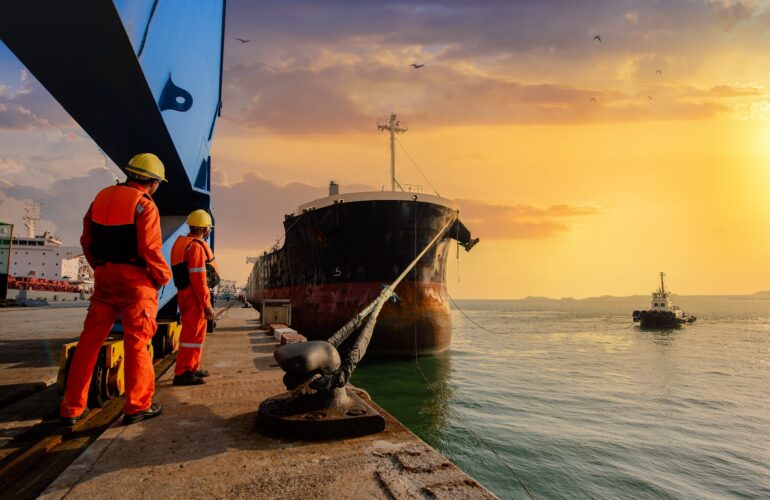Author:- Mr. Aishwarye Dubey | LL.M in International Maritime Laws & Practice
Mr.Aishwarye Dubey is a Maritime Lawyer serving the Indian and international shipping industry for many years. He is a voracious advocate for seafarers’ welfare and well-being. Hailing from a family of seafarers, he is thoroughly acquainted with the intricacies of the shipping industry. He utilizes his extensive expertise to work towards establishing a congenial working atmosphere for the seafarers, both sailing as well as working in on-shore jobs.
The Indian maritime fraternity is witnessing a tectonic shift in the legal frameworks that regulate the industry. With the introduction of a slew of changes in the Indian legal system pertaining to the maritime sector, it is imperative to have a basic understanding of them. The Government has been actively promulgating legislative enactments and executive policies which are either maritime-centric or affect the Indian maritime industry in a substantive manner. In the recent past, we have seen much maritime-centric legislation being enacted by the Government. The process started with the enforcement of the Admiralty (Jurisdiction and Settlement of Maritime Claims) Act, 2017[1] in 2018. This enactment has affected the length and breadth of the Indian maritime industry. The range encompasses shipping companies, ship charterers, ship brokerage firms, maritime law firms, P&I correspondents, ship management companies, and independent maritime law practitioners.
Whilst the Recycling of Ships Act, 2019[2] was promulgated to streamline the regulatory framework for environmentally-safe and efficient recycling of ships, the Coastal Shipping Bill, 2020 aims to improve the overall existing infrastructure pertaining to coastal shipping and inland waterways. Interestingly, the Honourable Prime Minister of India renamed the Ministry of Shipping the Ministry of Ports, Shipping, and Waterways[3]. This clearly shows that the Government is actively working towards making the Indian maritime industry truly robust and globally competitive.
To add to the mix, the Honourable Prime Minister recently launched PM Gati Shakti – National Master Plan for Multi-modal Connectivity. It will incorporate multiple infrastructure schemes of various ministries and State Governments such as Bharatmala, Sagarmala, Inland Waterways, land/dry ports, etc. The PM Gati Shakti will incorporate within its ambit economic zones such as fishing clusters, agri-zones, pharmaceutical clusters, and textile clusters to improve connectivity and make Indian businesses more competitive. With a substantial reduction in costs, the Indian logistics industry shall be able to present itself as an efficient tool to handle exports and imports within the country.
This plan is aimed at aiding and augmenting the Sagarmala Project. Within the framework within which it shall be operating, one of the primary pillars of this project is the focus on up-skilling and capacity building of the Indian port sector. It aims to bolster the capabilities of the port sector by collaborating with leading private players to streamline terminal management at the ports as well as enhancing the competitiveness of Indian ports. What is more encouraging is the fact that the Government is proactively working towards the “bluing” of our economy[4]. This means that a systematically increasing amount of active participation is envisaged for the maritime sector, in the mainstream economic activities of our country. This will increase our dependence on the water bodies, both inland and outward i.e., the seas and oceans surrounding our country on three sides. The “bluing” of our economy is essential for the holistic development of our economy[5].
India stands at the cusp of a blue revolution. The various sectors of the economy are gradually restarting and almost all of the leading international economic institutions are predicting robust resurgence[6] of the Indian economy. However, we should exercise caution and not be swept by a wave of virtual resurgence. Ground realities should be borne in mind and accordingly, active steps need to be taken to transform the positive effervescence into real and actual work. Whereas enacting new and focussed legislations are a welcome step in this regard, the real challenge lies in the implementation of such legislative enactments. In addition, the industry should also respond in an appropriate manner by incorporating systemic and structural improvements, which are being proposed by the Government, within its institutions and systems. When behavioral changes and overall working mechanisms improve, only then will the economy trudge along towards a growth trajectory.
Therefore, the onus lies on each individual to contribute in her/his own small way to help transform the Indian economy.
We, as a nation and a major economy, have to pay attention to our domestic maritime industry and its requirements so that, our economy can strike a balance between its land-based and sea/ocean-based economic activities.
This holistic approach will go a long way in transforming the overall image and outlook of the Indian economy on the global stage.
[1] India Code, “Admiralty (Jurisdiction and Settlement of Maritime Claims) Act, 2017”. https://www.indiacode.nic.in/bitstream/123456789/2256/1/A2017-22.pdf
[2] India Code, “The Recycling of Ships Act, 2019”. https://www.indiacode.nic.in/handle/123456789/15690?locale=en
[3] Press Information Bureau, “PM inaugurates Ro-Pax Terminal at Hazira”. https://www.pib.gov.in/PressReleseDetailm.aspx?PRID=1671210#:~:text=The%20Prime%20Minister%20renamed%20the,more%20clarity%20in%20the%20work.
[4] Taylor and Francis Online, “Blue Economy: Emerging global trends and India’s multilateral cooperation”. https://www.tandfonline.com/doi/full/10.1080/09733159.2020.1785087
[5] The Economic Times, “Blue economy comprises 4.1% of GDP, says Secretary of Earth Sciences”. https://economictimes.indiatimes.com/news/economy/finance/blue-economy-comprises-4-1-of-gdp-says-secretary-of-earth-sciences/articleshow/73809904.cms?from=mdr
[6] International Monetary Fund (IMF), “World Economic Outlook (October 2020)”. https://www.imf.org/en/Publications/WEO/Issues/2020/09/30/world-economic-outlook-october-2020#Full%20Report%20and%20Executive%20Summary




